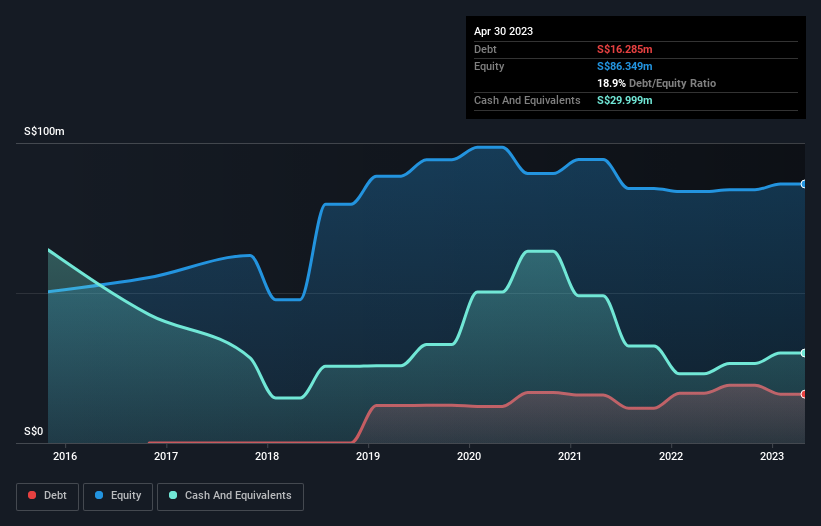The external fund manager backed by Berkshire Hathaway's Charlie Munger, Li Lu, makes no bones about it when he says 'The biggest investment risk is not the volatility of prices, but whether you will suffer a permanent loss of capital.' It's only natural to consider a company's balance sheet when you examine how risky it is, since debt is often involved when a business collapses. We note that HPC Holdings Limited (HKG:1742) does have debt on its balance sheet. But is this debt a concern to shareholders?
When Is Debt A Problem?
Debt and other liabilities become risky for a business when it cannot easily fulfill those obligations, either with free cash flow or by raising capital at an attractive price. Part and parcel of capitalism is the process of 'creative destruction' where failed businesses are mercilessly liquidated by their bankers. While that is not too common, we often do see indebted companies permanently diluting shareholders because lenders force them to raise capital at a distressed price. Of course, debt can be an important tool in businesses, particularly capital heavy businesses. The first thing to do when considering how much debt a business uses is to look at its cash and debt together.
View our latest analysis for HPC Holdings
What Is HPC Holdings's Debt?
The chart below, which you can click on for greater detail, shows that HPC Holdings had S$16.3m in debt in April 2023; about the same as the year before. However, it does have S$30.0m in cash offsetting this, leading to net cash of S$13.7m.

How Healthy Is HPC Holdings' Balance Sheet?
Zooming in on the latest balance sheet data, we can see that HPC Holdings had liabilities of S$77.9m due within 12 months and liabilities of S$19.8m due beyond that. Offsetting this, it had S$30.0m in cash and S$121.2m in receivables that were due within 12 months. So it actually has S$53.5m more liquid assets than total liabilities.
This surplus strongly suggests that HPC Holdings has a rock-solid balance sheet (and the debt is of no concern whatsoever). With this in mind one could posit that its balance sheet means the company is able to handle some adversity. Simply put, the fact that HPC Holdings has more cash than debt is arguably a good indication that it can manage its debt safely. The balance sheet is clearly the area to focus on when you are analysing debt. But it is HPC Holdings's earnings that will influence how the balance sheet holds up in the future. So if you're keen to discover more about its earnings, it might be worth checking out this graph of its long term earnings trend.
Over 12 months, HPC Holdings reported revenue of S$294m, which is a gain of 99%, although it did not report any earnings before interest and tax. With any luck the company will be able to grow its way to profitability.
So How Risky Is HPC Holdings?
While HPC Holdings lost money on an earnings before interest and tax (EBIT) level, it actually booked a paper profit of S$2.9m. So taking that on face value, and considering the cash, we don't think its very risky in the near term. We also take heart from the solid 99% revenue growth in 12 months; undoubtedly a good sign. That growth could mean this is one stock well worth watching. There's no doubt that we learn most about debt from the balance sheet. However, not all investment risk resides within the balance sheet - far from it. For example HPC Holdings has 4 warning signs (and 1 which shouldn't be ignored) we think you should know about.
If you're interested in investing in businesses that can grow profits without the burden of debt, then check out this free list of growing businesses that have net cash on the balance sheet.
Valuation is complex, but we're here to simplify it.
Discover if HPC Holdings might be undervalued or overvalued with our detailed analysis, featuring fair value estimates, potential risks, dividends, insider trades, and its financial condition.
Access Free AnalysisHave feedback on this article? Concerned about the content? Get in touch with us directly. Alternatively, email editorial-team (at) simplywallst.com.
This article by Simply Wall St is general in nature. We provide commentary based on historical data and analyst forecasts only using an unbiased methodology and our articles are not intended to be financial advice. It does not constitute a recommendation to buy or sell any stock, and does not take account of your objectives, or your financial situation. We aim to bring you long-term focused analysis driven by fundamental data. Note that our analysis may not factor in the latest price-sensitive company announcements or qualitative material. Simply Wall St has no position in any stocks mentioned.
About SEHK:1742
HPC Holdings
An investment holding company, engages in civil engineering, general building construction, and upgrading works in Singapore.
Solid track record with excellent balance sheet.
Market Insights
Community Narratives



